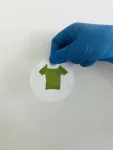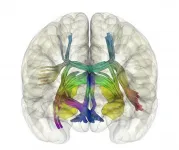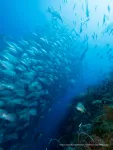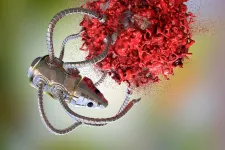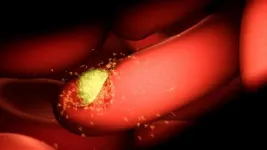(Press-News.org) LAWRENCE -- Like much of society, college athletics were thrown into disarray by the COVID-19 pandemic. While student athletes were suddenly prevented from competing, training or seeing as much of their teammates and coaches, those who perceived they were part of a positive sporting environment also coped better during the early days of the crisis, a new study from the University of Kansas has found.
KU researchers have long studied a caring, task-involved sporting climate, in which young athletes receive support and recognition for their efforts, while mistakes are treated as learning opportunities. But the pandemic provided a unique opportunity to see whether the approach helped collegiate athletes cope with the unique stresses and challenges that came with the disruption of their seasons. A survey of more than 700 NCAA Division I, II and III and NAIA student athletes showed those who had positive support of coaches, teammates and programs were coping with the challenges of the pandemic better than those who were involved in more ego-driven climates, where the primary focus is on performance outcomes.
Athletes took the online survey in early 2020 during the first wave of the pandemic.
Mary Fry"We were thinking about athletes across sports and competitive levels and wondering if they were experiencing the caring climate we study. Were they part of such a climate, and if they were, would that help equip them to come through the pandemic with a more positive perspective?" said Mary Fry, professor of health, sport & exercise science. "For a lot of athletes, this pandemic might be the biggest challenge they've faced in life. We found that those athletes who perceived they were part of a strong, caring team environment reported experiencing greater psychological well-being and support and care from coaches and teammates."
The study, co-written by Chelsi Scott and Troy Wineinger, doctoral candidates at KU, and Susumu Iwasaki of Fort Lewis College, was published in the Journal of Sport Psychology in Action. In addition to sharing survey results, the authors outlined positive responses athletes have experienced and strategies coaches and administrators could use to help athletes and staff cope.
While many respondents reported they had been able to stay in virtual contact with coaches and teammates, others responded that they were on their own. While they faced challenges including family health, financial pressures and disruptions to their academic lives, athletes involved in ego-driven sporting climates said they suffered blows to their personal identities. Losing access to competitions and facilities was exacerbated by losing contact with their coaches and teammates.
"The pandemic is so new to the research literature, but one thing we can compare it to is injury, if someone lost a season that way," Wineinger said. "It was fun to see how coaches were able to create positive outcomes for their athletes even during a pandemic. Unfortunately, a lot of athletes didn't get that support in their sport or in life."
Respondents who had support reported higher levels of mental health, overall well-being, hope, happiness and ability to cope with the stress of the pandemic. Athletes who perceived they were part of a caring environment routinely reported their coaches asked about their health and challenges they faced off the field. Those coaches also encouraged players to stay in contact with teammates. The students also reported that the blow of losing the highly structured life of a collegiate athlete was softened by coaches who offered hope and reassured them their contributions were still valued.
"A lot of the athletes who had this kind of support were able to become their own beacons of hope," Scott said. "Almost all said, 'The most important thing is we're staying healthy.' We've seen a lot of positive things come from the caring, task-involved climate on the field. This highlights the benefits off the field, especially in challenging times, the impact it can have on personal identity and well-being."
Based on the experiences of survey respondents and previous research, the authors shared several strategies coaches and administrators could use to support athletes throughout the pandemic, including checking in regularly; considering student views while making team decisions; helping them plan for their future and making their health a priority. That included promoting healthy behaviors; providing information on accessing food, medical and financial resources; identifying mental health concerns and promoting psychological well-being; and sustaining motivation and encouraging optimism.
While it is unclear when the pandemic will end or how collegiate athletics will return to normal, the authors said the study shows fostering a positive, caring climate can provide benefits to performance as well as help deal with the stress of a global health crisis.
"This adds to the benefits of coaches being intentional in supporting their athletes," Fry said. "Research has shown that athletes have more fun, manage stress better and compete harder when they perceive a strong and supportive climate within their teams. The evidence for the benefits within sport have been strong, but the benefits to athletes outside the sport are growing, and we think this information can really help the next generation of coaches and parents."
INFORMATION:
Social media may make it easier for people to engage online, but I does not provide certain benefits of real-life human interactions, says a Michigan State University researcher.
"Problematic social media use has been associated with depression, anxiety and social isolation, and having a good social support system helps insulate people from negative mental health," said Dar Meshi, an assistant professor in the Department of Advertising and Public Relations at MSU. "We wanted to compare the differences between real-life support and support provided over social media to see if the support provided over social media could have beneficial effects."
The research was published online April 29 in the journal Addictive Behaviors.
While ...
Living materials, which are made by housing biological cells within a non-living matrix, have gained popularity in recent years as scientists recognize that often the most robust materials are those that mimic nature.
For the first time, an international team of researchers from the University of Rochester and Delft University of Technology in the Netherlands used 3D printers and a novel bioprinting technique to print algae into living, photosynthetic materials that are tough and resilient. The material has a variety of applications in the energy, medical, and fashion sectors. The research is published in ...
Nearly 10,000 acres of lush seagrass vanished from Florida Bay between 1987 and 1991, leading to massive ecological changes in the region near the Florida Keys. Abundance of the seagrass, Thalassia testudinum, more commonly known as turtlegrass, a foundation species of the Florida Bay ecosystem, decreased extensively during what is considered to be one of the largest declines in seagrass cover in recent history.
Researchers from the University of South Florida, the Florida Fish and Wildlife Conservation Commission (FWC) and the University of North Carolina Wilmington documented the response of seagrasses after the die-off. ...
31 percent of pet dogs and 40 percent of pet cats tested positive to COVID-19 after their owners' own diagnoses, though under half displayed symptoms, in small Brazilian study.
INFORMATION:
Publicly available article: https://journals.plos.org/plosone/article?id=10.1371/journal.pone.0250853
Article Title: Investigation of SARS-CoV-2 infection in dogs and cats of humans diagnosed with COVID-19 in Rio de Janeiro, Brazil
Funding: MMS: This study was supported by CGLab/MoH (General Laboratories Coordination of Brazilian Ministry of Health), CVSLR/FIOCRUZ (Coordination of Health Surveillance and Reference Laboratories ...
Thanks to the so-called deep learning, a subset of artificial intelligence (AI) algorithms inspired by the brain, machines can match human performance in perception and language recognition and even outperform humans in certain tasks. But do these synthetic biologically inspired systems learn in the same way that we do?
According to a new article by first author Dr. Diogo Santos-Pata from the Synthetic Perceptive, Emotive and Cognitive Systems lab (SPECS) at IBEC led by ICREA Professor Paul Verschure, in collaboration with Prof. Ivan Soltesz at Stanford University, the mechanism of autonomous learning underlying these AI systems reflects nature more closely than previously thought. With their hypothesis and model, these scientists offer new insights into ...
A world first study within the Great Barrier Reef Marine Park has found limited fishing zones (yellow zones) are still important conservation and fisheries management tools when paired with no-fishing zones.
Lead author Dr April Hall, from the ARC Centre of Excellence for Coral Reef Studies at James Cook University (Coral CoE at JCU), said partially protected yellow zones still contain healthy numbers of reef fish targeted for recreational and commercial fishing. These include coral trout, tropical snappers, emperors and tuskfish.
Yellow zones limit, rather than prohibit, fishing through fishing gear restrictions. For example, limited line fishing is allowed with one rod or line and one hook per ...
Bowel cancer survival rates could be improved if chemotherapy drugs were delivered via tiny nanoparticles to the diseased organs rather than oral treatment.
That's the finding from Indian and Australian scientists who have undertaken the first study, using nanoparticles to target bowel cancer, the third most common cancer in the world and the second most deadliest.
The researchers have shown in animal experiments that nanoparticles containing the chemotherapy drug Capecitabine (CAP) attach themselves directly to the diseased cells, bypassing healthy cells and therefore reducing toxic side effects as well as the size and number of tumours.
The scientists, from the Manipal Academy of Higher Education, Indian Institute of Science and the University of South Australia, ...
National Health and Medical Research Council, the European Research Council and the Victorian Government.
WEHI researchers have identified how natural human antibodies can block malaria parasites from entering red blood cells, potentially indicating how new protective therapies could be developed against this globally significant disease.
The research provides greater insight into how antibodies block the entry of Plasmodium vivax malaria parasites into young red blood cells called reticulocytes. It builds on an earlier discovery that the P. vivax latches onto the transferrin receptor 1 (TfR1) to enter cells.
The research, led by Associate Professor Wai-Hong Tham and PhD student Li-Jin Chan ...
Many drug addicts take not only one substance but rather several. Scientists at the Max Planck Institute of Experimental Medicine in Göttingen have investigated the role that genes and the environment play in the development of such multiple substance consumption or polytoxicomania. Their results show that, in addition to genetic factors, the accumulation of several unfavourable environmental factors causes people to slip into such an extreme form of multiple drug use. Among the risk factors were sexual and physical abuse, living in a big city, and migration experience as well as the use ...
Aromaticity, a concept usually used to explain the striking stability and unusual reactivity of certain carbon-based molecules, could inspire the design of new catalysts with novel uses, KAUST researchers have shown.
Chemists first came upon the anomalous behavior of aromatic molecules in the nineteenth century while studying benzene. The unexpected stability of this six-carbon cyclic structure comes down to its electrons.
In general, bonding electrons hold a specific pair of atoms together in a discrete chemical bond. But in benzene, six electrons form a delocalized ring across the molecule. A host of other molecules share this feature. "Many classic examples of organic and organometallic reactivity can be explained on this basis," says Théo Gonçalves, ...
